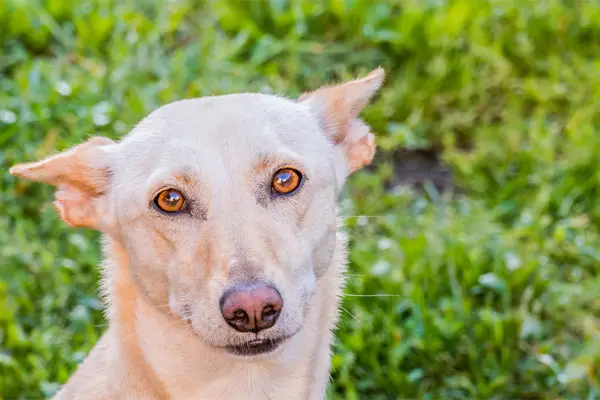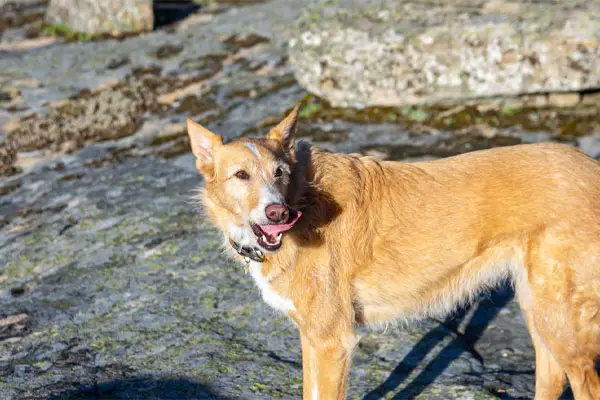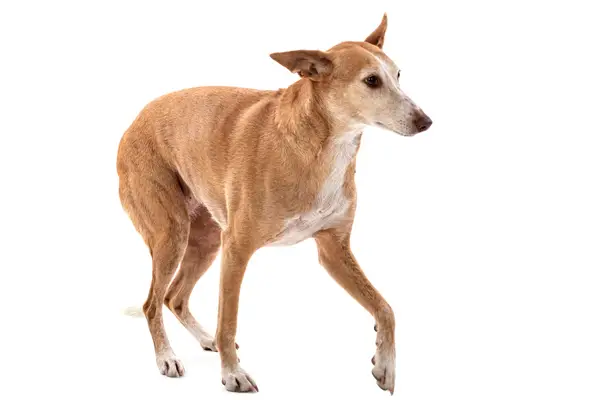Ibizan Hounds, also called Beezers ans Warren Hounds, are medium-sized dogs believed to have been around for centuries. The Ibizan Hound features an elongated head, erect ears, and long legs, almost similar and an Egyptian god Anubis. They also have narrow bodies, arched back, and a long tail.
Ibizan hounds are generally playful and athletic dogs that are the best fit with active owners or families. You should have at least a six-feet tall fence as these dogs are jumpers, and might escape. If you prefer to participate in competitions, they are one to get.
However, if you don’t want to, that’s also okay. Ibizan Hounds are wonderful companions, and they will surely give you lots of love and laughs.

Ibizan Hound Statistics
| Dog Breed Group | Hound |
| Breed Size | Medium |
| Height | 23.5-27.5 inches (male); 22.5-26 inches (female) |
| Weight | 50 pounds (male); 45 pounds |
| Lifespan | 11-14 years |
Ibizan Hound Ratings
| Energy level | |
| Exercise needs | |
| Requires attention | |
| Playfulness | |
| Trainability | |
| Shedding | |
| Grooming | |
| Friendly with family | |
| Friendly with kids | |
| Friendly with strangers | |
| Friendly with other dogs | |
| Prey Drive |
Ibizan Hound History
Ibizan Hounds have a very long history. They are believed to have existed about 5,000 years ago and are considered one of the most ancient dog breeds.
These dogs are believed to have a close resemblance to Anubis, Egypt’s Watchdog of the Dead. They have also been drawn on carvings and other artifacts, which led people to believe that this is true.
However, when genetic research results came out, it was found that the Ibizan hounds descended from a different dog and may not have existed for these long.
So, where did the Ibizan Hounds really come from? One story suggests that they have lived from the Mediterranean island of Ibiza, where they got their name. They were traditionally used for hunting rabbits and other small games.
The life they have on this island was harsh, which made them gain several skills and shaped them to the hardy dogs they are today. They had remained hidden from the rest of the world for thousands of years until the 1950s when the dog’s exportation began.
In the year 1956, a pair of the breed was brought to the US. The pair produced the first litter, which became the foundation of the dogs in the US. It was only in 1979 when the American Kennel Club finally recognized the dog.

Ibizan Hound Temperament
Ibizan Hounds are family-oriented, even-tempered, and polite dogs. They are lively dogs, and as they have strong hunting instincts, they’re better in households that don’t have small animals. They tend to chase any small that moves and will chase cats, rabbits, or hamsters.
If you have children at home, then there’s nothing to worry about. Ibizan Hounds are known to be good with children, but always keep close supervision when it comes to toddlers.
They are not the dogs to get if you’re looking for a cuddle buddy. They don’t really like being touched, especially if you catch them by surprise. So teach your children not to startle him when he’s sleeping or eating.
Although generally relaxed and calm indoors, the Beezers are fast-moving dogs. They need tons of exercise, which makes them ideal in an active household. They are also best living in houses with a large backyard, and tall fences as these dogs can be quite the runners and jumpers.
Another trait noticeable to an Ibizan Hound is their sense of hearing. This makes him a very excellent watchdog. The only difference is, they don’t bark to alert you of something suspicious; instead, you should pay close attention to their ears.
These dogs are also known to be polite with strangers. However, they stay cautious and ready to protect if the need requires.
Early socialization is highly essential if you want your dog to be more well-rounded. This will also help keep his temperament stable at all times. Getting him accustomed to new things will let him be more in control of his emotions in every situation he’s in.
Training is highly essential for these dogs, and it might come as challenging for inexperienced owners. These dogs love to be in control, so you must always approach him calmly and patiently. Food will be an excellent motivation.
Ibizan Hound Care Requirements
- Nutrition: Ibizan Hounds need to eat high-quality and well-balanced meals daily. They should do well on any diet, but make sure that you don’t put in any ingredients that they are allergic to. Only buy high-quality ingredients for your dog’s meals. Even dog food and treats should be of premium-quality, and must not contain fillers, additives, and by-products. You should also with the amount of food you serve them in every meal. Overfeeding can lead to them being overweight, and this is not ideal when it comes to any dog breeds. So, ask your vet for some advice or the right guide on your dog’s feeding requirement.
- Grooming: There are two varieties of Ibizan Hounds – smooth and wired. However, regardless of the variety you have, the same grooming should be done. The Ibizan Hound’s coat occasionally sheds, which means occasional brush and bath are also needed. Weekly brushing is also great, as it will help keep shedding at a minimum. This will also help in removing any debris stuck on the skin. Your Ibizan Hound’s ears should be checked weekly to prevent wax build-up and ear infection. Nails should be trimmed regularly so as not to cause pain and discomfort to your dog.
- Exercise: Ibizan hounds are very athletic dogs. They require lots of physical activity daily. They enjoy vigorous play sessions with their owners the most, so you need to be active if you want to own this dog. Long walks should also suffice, but you should do this couple of times a day. If you’re a jogger, these are the perfect companions. Remember to keep these dogs on a leash as they have a strong prey drive. It’s also vital that you install high and secured fences as these dogs can be quite a jumper.
- Health: Ibizan Hounds are generally healthy dogs with a long lifespan. However, they are still susceptible to some diseases. And though they may not acquire these all in their lifetime, it’s still crucial for dog owners to be aware of these. As some of these diseases are hereditary, it’s still best to meet one of your dog’s parents. This will help you see what conditions exist in them that your dogs may get. Continuously monitor your dog’s behavior, too, and if you notice some changes, take him immediately to the vet. Here are the most common diseases that the Beezer might acquire in his lifetime:
-
- Seizures
- Allergies
- Axonal Dystrophy
- Cataracts
- Deafness
- Retinal Dysplasia
-
- Lifespan: The life expectancy of Ibizan Hounds is 11-14 years.

Famous Ibizan Hounds
Hannibal and Tanit: The first Ibizan Hounds imported to the US.
Fun Facts About Ibizan Hounds
- Ibizan Hounds originated from the island of Ibiza thousands of years ago.
- They were used for hunting rabbits and small game.
- They have been hidden from the rest of the world for 2,000 years.
- They are called by other names: Balearic Hound, Galgo Hound, or Podenco Ibicenco
- The name of the breed is pronounced as “I-beeth-an” and not I-beez-an.
- The dogs were first brought to the US in 1956.
- The American Kennel Club recognized them in 1978
Check Out Other Hound Dog Breeds:
Afghan Hound, American English Coonhounds, American Foxhound, Basenjis, Basset Hound, Beagle, Black and Tan Coonhound, Bloodhound, Bluetick Coonhound, Borzois, Cirnechi dell’Etna, Dachshund, English Foxhound, Grand Basset Griffon Vendeens, Greyhound, Harrier, Icelandic Sheepdogs, Irish Wolfhound, Norwegian Elkhound, Otterhound, Petit Basset Griffon Vendéen, Pharaoh Hounds, Plotts, Portuguese Podengo, Redbone Coonhound, Rhodesian Ridgeback, Salukis, Scottish Deerhounds, Sloughis, Treeing Walker Coonhound, Whippet
